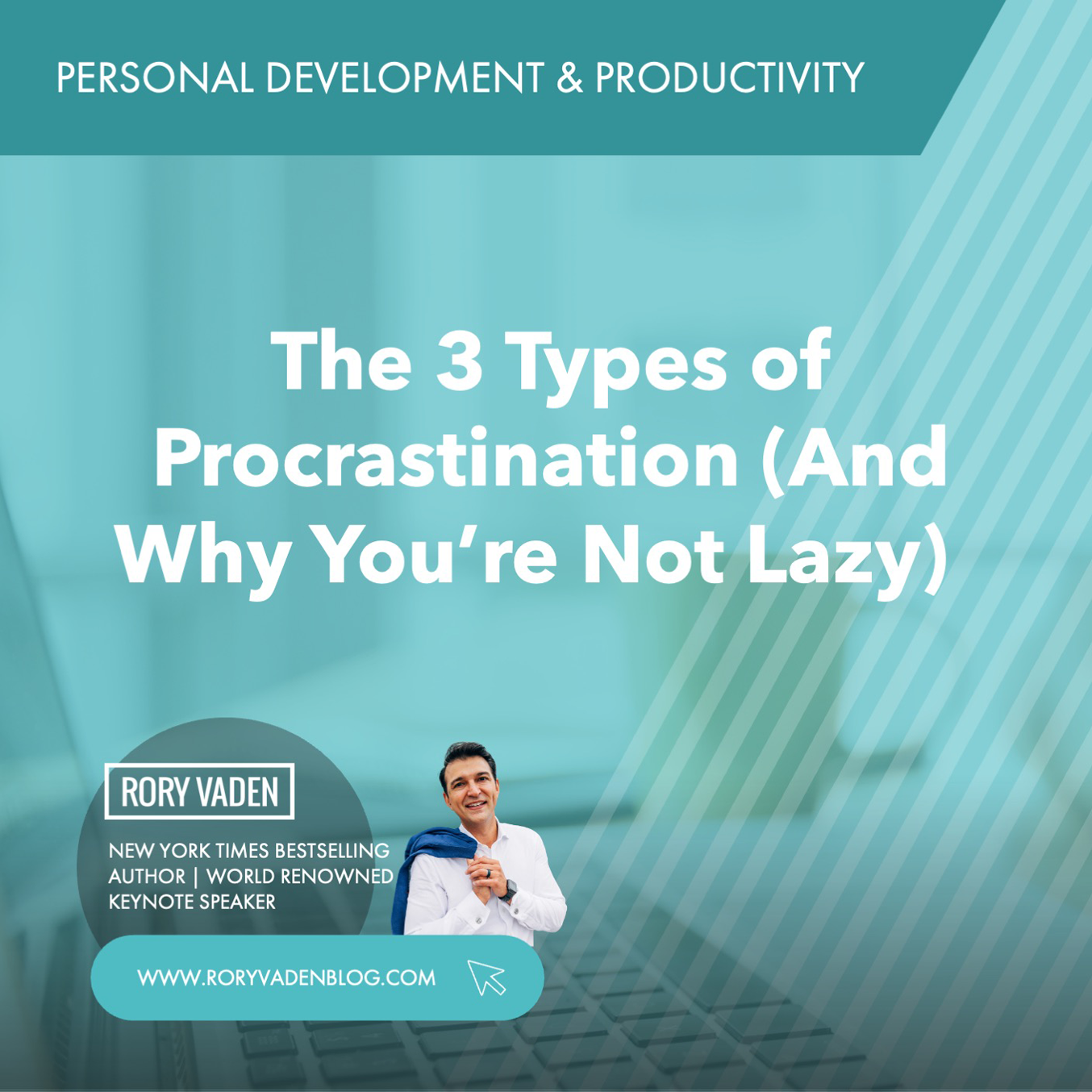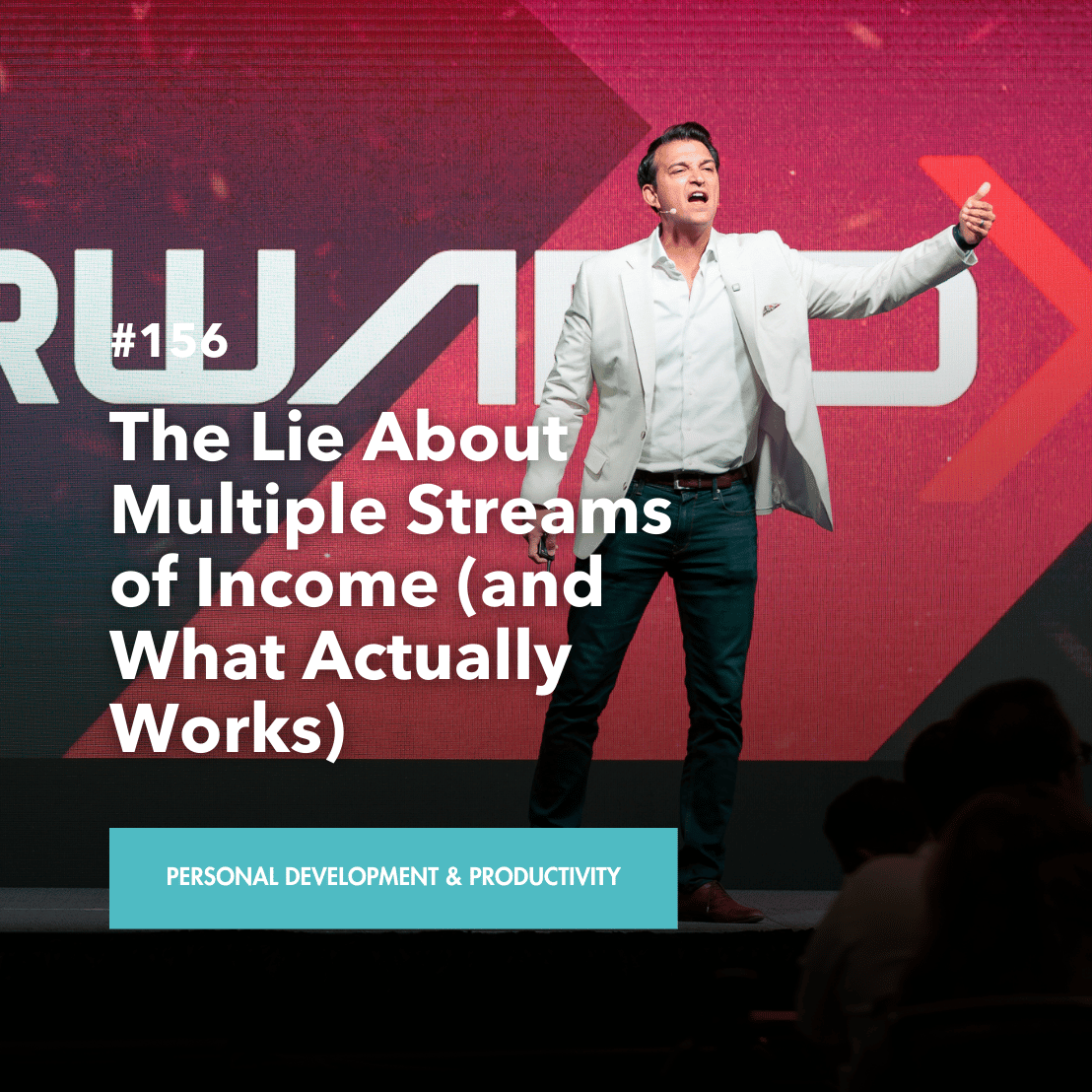If you’ve ever been called lazy because you procrastinate, I’m here to tell you there’s a big difference between being lazy and procrastinating.
Even though you might have been labeled “lazy” by parents, teachers, or bosses, chances are you’re not inherently lazy.
To fully understand this concept, we need to look at the 3 types of procrastination, which I introduced in my first book, Take the Stairs.
Once you understand the 3 types of procrastination, you can use them to strategically achieve your goals.
1. Classic Procrastination (aka Laziness)
The first type of procrastination is classic procrastination, and this one resembles laziness.
It’s when you consciously delay doing the things you know you should do.
You might think, “I should get that task done, but I just don’t feel like it.”
This is the stereotypical form of procrastination, and it’s the type most people are familiar with.
When you’re simply avoiding something because you’d rather be lounging around or scrolling Instagram, it might indeed be a sign of laziness.
But please note: not all procrastination falls into this category.
2. Creative Avoidance (Disguised Procrastination)
The second type of procrastination is creative avoidance.
Creative avoidance is when you unconsciously create tasks and distractions that make you feel productive, even though you’re really just dodging the things that matter most.
For example, you might tell yourself, “I’m going to watch a quick YouTube video to learn how to create database automations in Notion.”
But three hours later you’re watching videos of people tying their shoes underwater.
This is self-sabotaging behavior.
You think you’re being productive because you’re “busy,” but in reality, you’re just distracting yourself from doing the difficult or uncomfortable tasks you’re avoiding.
Creative avoidance can often be confused with procrastination, but it’s really just masked busyness.
You’re doing things, but none of them are the things that move the needle forward.
This is not laziness—it’s avoidance disguised as productivity.
3. Priority Dilution (The Overachiever’s Trap)
The third type of procrastination is priority dilution, and this can happen to even the most driven, successful people.
This form of procrastination affects high performers, people who are constantly trying to get things done but find themselves overwhelmed by the sheer volume of urgent priorities vying for their attention.
Here’s the thing: priority dilution doesn’t look like procrastination on the surface.
It looks like productivity.
It’s when you’re checking off a hundred tasks, answering every email, and attending back-to-back meetings, but in doing so you neglect the truly significant things that matter most.
In this case, you’re not lazy at all.
In fact, you’re probably working harder than most people.
But you’re still procrastinating—procrastinating on the most important things by allowing yourself to get caught up in what’s latest and loudest.
This type of procrastination can look like a life of constant interruption.
(It’s incredibly common among high achievers.)
Enter: Procrastinating on Purpose
There’s another concept I introduced in my second book, Procrastinate on Purpose.
This is where procrastination becomes a strategic tool.
Some of the most successful entrepreneurs and leaders have mastered the ability to procrastinate on purpose.
Procrastinating on purpose is deliberately putting off trivial and insignificant tasks so that you can create space to focus on the things that really matter.
This isn’t laziness—it’s strategic deferral.
Successful people don’t get addicted to checking off small tasks to feel productive.
Instead, they focus on the big, meaningful actions that drive results, even if it means leaving certain tasks unfinished.
Interestingly, research has shown that when we delete emails or check something off our to-do list, our brain releases dopamine—the same chemical that makes us feel good.
This can trap us into thinking we’re accomplishing important work, but in reality, we’re just getting a quick hit of satisfaction from trivial tasks.
People who master procrastinating on purpose know how to protect their time and attention for the most valuable tasks—even when others are pressuring them to do otherwise.
They can say, “That might be urgent for you, but it’s not important for me right now,” and focus on what truly matters.
What’s the Difference Between Laziness and Procrastination?
The difference between laziness and procrastination is this: laziness is knowing you need to do something and choosing not to because you just don’t feel like it.
It’s conscious avoidance.
Procrastination, however, comes in various forms and isn’t always about avoiding work. It could be:
- Creative avoidance: where you distract yourself with less important tasks because they feel safer or easier.
- Priority dilution: where you get caught up in urgent tasks and lose sight of the important ones.
- Strategic procrastination: where you intentionally delay trivial tasks to focus on more meaningful work.
None of these forms of procrastination make you lazy.
In fact, some of them can be signs that you’re actually working hard, just not in the most effective way.
How to Know if You’re Lazy or a Strategic Procrastinator
So if someone calls you lazy, it’s worth asking yourself: Am I truly lazy, or am I just procrastinating in a different way?
Here’s how you can tell the difference:
- If you’re constantly distracted by trivial tasks, you might be dealing with creative avoidance. You’re not lazy—you’re just avoiding discomfort by filling your time with low-priority tasks.
- If you’re overwhelmed by urgent priorities and feel like you’re always interrupted, you might be suffering from priority dilution. You’re working hard, but your attention is being pulled away from what matters most.
- If you’re deliberately putting off certain tasks to focus on more meaningful ones, you’re likely procrastinating on purpose—a strategic move that can increase your effectiveness and productivity.
You’re Not Lazy, You’re Strategic
Just because you’re procrastinating doesn’t mean you’re lazy.
Many of us have a natural ability to prioritize and protect our time for what really matters, even if it doesn’t always look that way to others.
And while some people may call you lazy because you don’t do things on their timeline, you might actually be using a strategic form of procrastination to create space for the important things in your life.
Now, if it’s your boss who’s calling you lazy, that’s a different story—you might need to learn how to balance strategic procrastination with workplace expectations.
But if you’re an entrepreneur or someone who thrives on focusing only on the high-value tasks, this might be your superpower.
So the next time someone calls you lazy, you can tell them: “I’m not lazy.
I’m just procrastinating on purpose.”
Interested in learning more about how to master procrastination and prioritize your time?
Check out my New York Times bestselling books, Take the Stairs and Procrastinate on Purpose, or watch my viral TED Talk on multiplying your time.
And if you’re ready to take your personal brand to the next level, schedule a free brand call with Brand Builders Group.

















